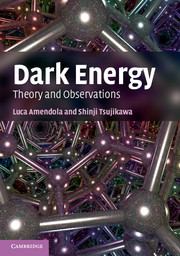Book contents
- Frontmatter
- Contents
- Preface
- List of Frequently used symbols
- 1 Overview
- 2 Expansion history of the Universe
- 3 Correlation function and power spectrum
- 4 Basics of cosmological perturbation theory
- 5 Observational evidence of dark energy
- 6 Cosmological constant
- 7 Dark energy as a modified form of matter I: Quintessence
- 8 Dark energy as a modified form of matter II
- 9 Dark energy as a modification of gravity
- 10 Cosmic acceleration without dark energy
- 11 Dark energy and linear cosmological perturbations
- 12 Non-linear cosmological perturbations
- 13 Statistical methods in cosmology
- 14 Future observational constraints on the nature of dark energy
- 15 Conclusion and outlook
- 16 Answers to the problems
- 17 Mathematical Appendix
- References
- Index
10 - Cosmic acceleration without dark energy
Published online by Cambridge University Press: 05 March 2013
- Frontmatter
- Contents
- Preface
- List of Frequently used symbols
- 1 Overview
- 2 Expansion history of the Universe
- 3 Correlation function and power spectrum
- 4 Basics of cosmological perturbation theory
- 5 Observational evidence of dark energy
- 6 Cosmological constant
- 7 Dark energy as a modified form of matter I: Quintessence
- 8 Dark energy as a modified form of matter II
- 9 Dark energy as a modification of gravity
- 10 Cosmic acceleration without dark energy
- 11 Dark energy and linear cosmological perturbations
- 12 Non-linear cosmological perturbations
- 13 Statistical methods in cosmology
- 14 Future observational constraints on the nature of dark energy
- 15 Conclusion and outlook
- 16 Answers to the problems
- 17 Mathematical Appendix
- References
- Index
Summary
The crucial kick to dark energy research was the interpretation i n 1998 of standard candle observations in terms of cosmic acceleration in the FLRW metric. What we observe is however merely that distant sources (z> 0.3) recedes lower than we would predict in an Einstein–de Sitter Universe calibrated through “nearby” sources. That is, we observe different expansion rates at different distances rather than an increase in the expansion rate at all distances. Can this be caused by a strong in homogeneity rather than by an accelerating Universe?
We also noticed that cosmic acceleration seems to be a recent phenomenon, at least for standard dark energy models. The epoch in which dark energy begins to play a role is close to the epoch in which most of the cosmic structures formed out of the slow linear gravitational growth. We are led to ask again: can the acceleration be caused by strong in homogeneities rather than by a dark energy component?
The answer to both questions is yes, at least in principle. First, we can always interpret a homogeneous evolution H(z) a s a line-of-sight inhomogeneous rate H(r) since we observe only a long our past light cone ds2 = 0 and time and distance a re inextricably related. Second, one can always arrange matter sources so that in some region of the Universe they accelerate away from each other even if on larger scales the expansion is decelerated.
- Type
- Chapter
- Information
- Dark EnergyTheory and Observations, pp. 285 - 295Publisher: Cambridge University PressPrint publication year: 2010
- 1
- Cited by



